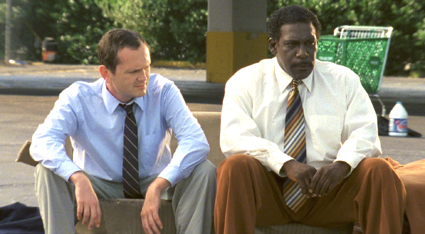FILM-FORWARD.COMReviews of Recent Independent, Foreign, & Documentary Films in Theaters and DVD/Home Video
Directed by: Craig Zobel. Produced by: Melissa Palmer, David Gordon Green, Richard Wright & Zobel. Written by: George Smith & Zobel. Director of Photography: Adam Stone. Edited by: Tim Streeto & Jane Rizzo. Music by: David Wingo. Released by: Magnolia Pictures. Country of Origin: USA. 106 min. Not Rated. With: Pat Healy, Kene Holliday, Rebecca Mader, John Baker, Robert Longstreet & Tricia Paoluccio. In an age of YouTube, iTunes, and DIY Pro Tools, the rise of American Idol and its ilk has conflated H.L. Mencken’s and Andy Warhol’s maxims – now no one can go broke promising the American public their 15 minutes of musical fame. In Great World of Sound, the record producers are as fake as the gold records they spray paint in the opening scene. Debut director/co-writer Craig Zobel draws on the experiences and spiels of his father, who was caught up in a music industry con in the 1970’s, to present a touching portrait of how well-meaning folks get ensnared. After a string of miscellaneous jobs, milquetoast Martin (Pat Healy) responds to an ad and a job recruitment seminar to become a talent scout for the titular company. Flattered by the idea of finding and helping those with talent, Martin buys into the smooth-talking operation to get hopefuls to commit to cash up front as a down payment for CD production. The company targets less sophisticated areas, pushing its traveling salesmen out to Birmingham, Louisville, and Biloxi, before Martin reaches his Waterloo in Indianapolis. Until then, Martin is unexpectedly successful as his naive sincerity is matched in an unlikely pairing with optimistic Clarence (Kene Holliday). Since his days on TV’s Matlock, Holliday now frequently serves as an evangelical minister, and his sales pitch recalls an American tradition of con men from Elmer Gantry to Leap of Faith, particularly when he plays the race card to successfully appeal to African-American aspirants. Even as Martin and Clarence are lauded and rewarded as the best salesmen, they are becoming suspicious, especially as Martin starts to care about the ones with talent who he wants to actually help, such as the shy young black girl for whom he impulsively puts up his own money. When other scouts feel guilty about signing up the less talented, silver-haired and tongued company executive Shank (John Baker), whose GWS initials are conveniently what checks are being made out to, explains that like a university, the mediocre have to be admitted to subsidize the best and the brightest. But when the lovely bartender Gloria (Tricia Paoluccio) auditions with a captivating voice and demeanor, Martin reaches the pinnacle of his ethical dilemma, evincing far more angst than any of the swindlers in the real-life Enron: The Smartest Guys in the Room. It’s hard not to cry at the pain of Martin shedding his naiveté or to hold your breath as you wonder how far he will go. The film is very sensitive to those roped in, but the plaintive reality of the auditioners gradually feels unsettling and goes on too long, even though the hopefuls’ earnestness makes us feel the arc of Martin’s and Clarence’s emotions. Though the two key performers in the storyline are scripted, the auditions that take up almost half the screen time were filmed and edited like reality television or a Christopher Guest mockumentary of such programs. The musical participants responded to ads in local papers in Charlotte, NC, and Atlanta: “Want a hit record? Be a star? GWS Recording holding open auditions.” The director explains that the respondents were filmed with an extensive setup of hidden cameras and microphones, with the actors guided by phone calls and text messages from “the boss.” The improvising actors improved in their sales pitch over time just like their characters.
Before any money could actually be handed over, the true purpose of the interviews was revealed and the performers were allowed to review their
footage to decide if they wanted it to be used in the film. (This is the opposite of Sacha Baron Cohen’s improvisational technique in Borat
where the participants were warned and required to sign releases in advance.) This detailed, time-consuming process could be why the director couldn’t
resist leaving so much of the footage in the film, when sprightlier editing would have benefited the flow.
Nora Lee Mandel
|
